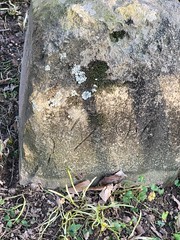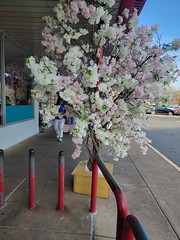‘Inner territory’/Inner China 内地/中國内地 nèidì/zhōngguó nèidi is a neologism that seems to be replacing ‘Mainland’ 大陸/中國大陸 dàlù/zhōngguó dàlù to refer to the areas that are integral parts of the PRC. The other areas of the PRC (sometimes also called ‘within China’s borders’ 境内/中國境内 jìngnèi/zhōngguó jìngnèi as opposed to Hong Kong and Macao (which have nominally different ‘operating systems’ under the o, now-fading one country, two systems 一國兩制) formula as well as Taiwan/Taiwan region 台灣/台灣地區 táiwān/táiwān dìqū(which includes several offshore islands of Fujian Province) which remains actually autonomous/functionally independent/independent (take your pick) but a part of the PRC according to PRC law. Travelers going between the two zones must pass through customs and passport control even though they aren’t thought of travelling between different zones of the PRC.
I came across this usage first in looking at in a Sougou online encyclopedia 搜狗百科 article about the Chinese writer, editor and NPC legislator Jiang Shengnan: 蒋胜男(1973年11月18日-),浙江温州人,中国内地女作家,国家二级编剧,浙江省网络作家协会副主席,晋江原创网开山驻站作者之一 [which would translate into English as something like: Jiang Shengnan (November 18, 1973 – ), a native of Wenzhou, Zhejiang Province, is a Inner China female writer, a national second-rank screenwriter, vice chair of Zhejiang Province Internet Online Writers Association, and one of the authors in residence at the opening of Jinjiang Writer’s Website for Publishing Original Works.]
The expression Inner China woman writer is bolded in the article, perhaps to recommend the neologism inner China 中國内地 zhōngguó nèidi. Just where this change in terminology might be headed is not clear yet.
I could imagine the next step would refer to Hong Kong, Macao and Taiwan as Outer China 中國外地/zhōngguó wàidì but what I might do as a sly Chinese propagandist? Not have been to a Party school (though I did stay as a county Party school guest house in Henan twenty years ago) . Subtly changing frames of reference is part of the art of propaganda. Imaging how China’s South China Sea claims would look if everyone instead did refer to that area as either the West Philippine Sea or the East Vietnam Sea/East Sea as people in the Philippines and Vietnam do.
I’ll copy below translations of two Chinese language articles discussing this neologism albeit a neologism that seems to have migrated from some legal documents to wider usage as the 2021 Chinese language Wikipedia article 中国内地 explains.
As can be seen below, there are several and evolving understandings of what neidi means. Above, a writer from Zhejiang Province is from neidi. In the citations below neidi can mean the Mainland or more alternatively, Hong Kong and Macao (and freeing up the word Mainland 大陸 to be redefined to include Hong Kong and Macao.
From the Q&A online website Zhihu
What is the difference between the terms “Mainland” and “Inner Territory”?
Q. I have watched Taiwan’s variety shows, some guests clearly speak of “大陸 mainland”, but the subtitles will be changed to “内地” inner territory, or changed the other way, somebody says one thing and it is changed into the other. Then I’ve also heard some Hong Kong celebrities use the two interchangeably. I’ve heard people say that “mainland” is something Taiwan independence advocates say but Chinese don’t like to say that. What is the difference between these two expressions?
A1. copied from the Baidu Online Encyclopedia — I didn’t write it myself, from the following link
There is a difference between “mainland China” and “Inner Territory of China”, and the specific meaning of the term varies according to the context and place of use due to the political and geographical factors of Hong Kong, Macao and Taiwan. Since Hong Kong and Macau are geographically connected to the land, they are commonly referred to as “Inner China” or “Inner Territory” by the central government after the handover.
It is the practice of the official media of the People’s Republic of China to use “Inner” instead of “Mainland” when referring to Hong Kong and Macao; when referring to Taiwan, “Mainland” is not used, but “mainland” or “mainland China”.
In China, the normative concept corresponding to the Hong Kong and Macao Special Administrative Regions should be “Inner China”, and the governments of the Hong Kong and Macao Special Administrative Regions currently use the concept of “Inner China” to refer to the Central Government, for example, the “Inner China” agreement signed between the Central Government and the Government of the Hong Kong Special Administrative Region. For example, Inner China and Hong Kong Closer Economic Partnership Arrangement signed between the Central Government and the HKSAR Government, and the Inner China and Macao Closer Economic Partnership Arrangement signed between the Central Government and the Macao SAR Government.
To be honest I can’t imagine myself coming to answer this question, after all I just finished disliking people in the group and then being told not to say. I don’t know what to say about these people who don’t even understand basic political terms ……
A2. Inner China refers to Mainland China (China excluding Hong Kong and Macao) — it is a term everyone can use — ~ subconsciously it means that they are all one country. Using the word Mainland implies a mainland and islands so obviously there is a sense of distance.
A3. In Hainan, the Northern Mainland 北面陸 means the Mainland 大陸.
A4. Inner China refers to the China Mainland (excluding Hong Kong and Macao), therefore the Mainland refers to the China Mainland (including Hong Kong and Macao) The distinction is about whether Hong Kong and Macao are included or not.
Translated excerpt of Zhihu article “大陆”和“内地”两个称呼有什么区别?
The word change may just be about recognizing the fading away of one country, two systems rather than anything about Taiwan.
Or perhaps one day the official usage might refer to Taiwan as External Territory of China/Outer China 中國外地 rather than as Taiwan as the Chinese language the ecosystem evolves and is pushed along to meet official needs and conceptualizations? But I am not a word seer 語言先见者。。。



